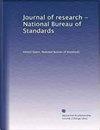Open Tubular Liquid Chromatography and the Analysis of Single Neurons
Journal of research of the National Bureau of Standards
Pub Date : 1988-06-01
DOI:10.6028/jres.093.094
引用次数: 10
Abstract
Liquid chromatography in open tubular columns (OTLC) offers a means of achieving separations of high resolving power within analysis times of minutes to hours. A theory which predicts the optimal dimensions for an open tubular column for a given set of analytical conditions has been developed [1]. This theory predicts that for a wide range of possible inlet pressures and analysis times the most efficient columns will result when the column inner diameter is between 1.5 and 3 prm. A column of 2 Mrm diameter and 2 meter length should be capable of producing a million theoretical plates for an analyte with a capacity factor of 10 (strongly retained) and a retention time of 100 minutes.开管液相色谱法与单个神经元的分析
开管柱液相色谱(OTLC)提供了一种在分析时间为几分钟到几小时内实现高分辨率分离的手段。在给定的一组分析条件下,已经发展了一种理论来预测开管塔的最佳尺寸。该理论预测,对于可能的进口压力和分析时间的大范围内,最有效的柱将导致当柱内径在1.5和3prm之间。直径2 mm,长度2米的色谱柱应该能够为分析物生产一百万个理论板,容量系数为10(强保留),保留时间为100分钟。
本文章由计算机程序翻译,如有差异,请以英文原文为准。
求助全文
约1分钟内获得全文
求助全文

 求助内容:
求助内容: 应助结果提醒方式:
应助结果提醒方式:


